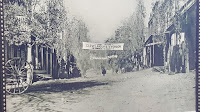Angels Camp and the California Goldrush
I was going through a bunch of pictures on my computer today.
I used to urge everyone to scan and organize old, printed photos. I finally got
that chore done myself a while ago. But I have come to realize that my computer
is a lot like an old shoebox full of photos tossed in. Time to get organized. I’m
working on getting that chore done. While eating the elephant one bite
at a time, I came across some pictures taken in the city museum of the California
Gold Rush town of Angels Camp that I thought I’d share.A short few years ago we did a California Gold Rush trip
that included Old Town Sacramento, Sutter’s Fort, and the Marshall Gold Discovery State Park. Part of that trip was driving down a major portion of
California State Highway 49, sometimes called the “Gold Rush Highway.” You can
start northeast of Sacramento in the town of Grass Valley and drive the Gold
Rush Highway over 200 miles south, all the way to Oakhurst and Yosemite
National Park. Along the way, you’ll pass multiple Gold Rush Towns with intriguing
names like Coloma, Sonora, Jamestown, Chinese Camp, Placerville, and of course,
Angels Camp.
Subscribe to:
Post Comments (Atom)







No comments:
Post a Comment